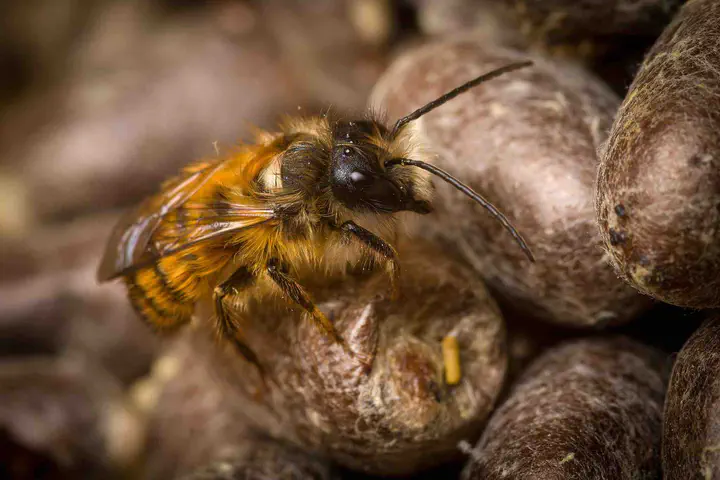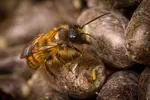Nutritional ecology of wild bees
 Red mason bee hatching from cocoon. Hazet/Wikimedia Commons, CC BY-SA
Red mason bee hatching from cocoon. Hazet/Wikimedia Commons, CC BY-SAWe secured £833,339 of BBSRC funding for a project entitled ‘Resilience of pollinators in a changing world: impact of developmental environment on metabolism and energetic budgets in social and solitary bees’, which runs from Jan 2024 to Jan 2027. Visit pollinators.hull.ac.uk for more details.
The project, which is a collaboration with Dr Beth Nicholls (@BethBees) and Prof Jeremy Niven, both at the University of Sussex, will investigate and model the dietary requirements of wild bees: solitary mason bees and social bumblebees, and how these are altered by increasing temperatures. The pollen and nectar collected by bees from different crops vary widely in the content of carbohydrate, protein and fat. Bees’ health depends on access to a mix of nutrition appropriate for the conditions - but the climate is heating up, and so the ideal mix may change. Crucially, if this affects bees’ flower choices, then the pollination services bees provide today may not be the same at higher temperatures. This project will measure and model the effects of changing nutrition and temperature upon these bees, allowing us to design appropriate, future-proof mitigation/intervention measures. It will help to close a critical gap in our understanding of bee foraging behaviour and the modulating role of temperature.
Bees, managed and wild, are important globally for their role in pollination, which is central to natural and agricultural ecosystems. Unfortunately, bees are declining, partly due to poor nutrition. Despite this, we do not yet understand how bees deal with variable quality food in patchy modern landscapes. We know particularly little about larval nutrition, where all growth occurs. This knowledge gap has huge implications; we are changing available pollen resources for bees to feed offspring, without understanding how bees will respond. Bee larvae are unusual because all food selection is done by parents: the only nutritional choices a larva makes are how much pollen to eat, store and excrete. So, how do parents and larvae collectively ensure that larvae receive balanced diets?
Our lab has been conducting some of the first investigations of the nutritional ecology of larval bees thanks to new diet protocols we have developed. We use the Geometric Framework (GF); a rigorous, quantitative method for determining whether and how animals regulate the nutrients they eat. We are investigating effects of different pollen nutritional quality (carbohydrate, protein, lipid) upon larval consumption and development, at different environmental temperatures representing climate warming scenarios.
So far we have found that carbohydrate rather than protein is the main determinant of fitness – and bee larvae typically tightly regulate consumption of carbohydrate, but tolerate excess protein – patterns typical of predators, not vegetarian bees. In pilot data, surprisingly, we have found that this pattern is only typical at normal or cooler temperatures. At elevated temperatures, typical of a climate change scenario, this rule is reversed: at 25°C, larvae stop regulating carbohydrate and instead regulate protein, tolerating excesses of carbohydrate.
